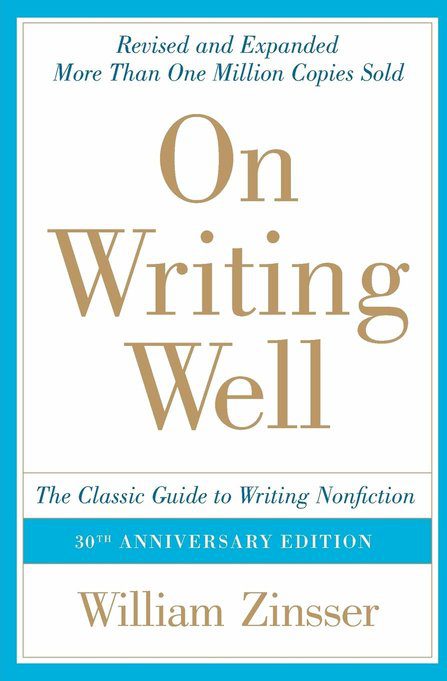Print | Kindle (eBook) | AudioBook
This blog is an experiment on writing well, hence I am always on the lookout for ways to improve my writing skills. My quest to develop my writing skills lead to reading this insightful book: On Writing Well: The Classic Guide to Writing Nonfiction by William Zinsser.
The Book contains lots of insights and time tested advice for aspiring writers and students of the game.
Here are my favourite take aways and action steps from reading On Writing well:
The professional writer must establish a daily schedule and stick to it… writing is a craft, not an art, and… the man who runs away from his craft because he lacks inspiration is fooling himself. He is also going broke… if your job is to write every day, you learn to do it like any other job. – William Zinsser, On Writing Well
Writers Write
- There are all kinds of writers and all kinds of methods, and Any method that helps you to say what you want to say is the right method for you. Some people write by day, others by night. Some people need silence, others turn on the radio. Some write by hand, some by computer, some by talking into a tape recorder
- Some people write their first draft in one long burst and then revise; others can’t write the second paragraph until they have fiddled endlessly with the first. But all of them are vulnerable and all of them are tense.
- They are driven by a compulsion to put some part of themselves on paper, and yet they don’t just write what comes naturally. They sit down to commit an act of literature, and the self who emerges on paper is far stiffer than the person who sat down to write.
Writer: Says something that other people will want to read
Simplicity
Our life is frittered away by detail. Simplify, simplify – Henry David Thoreau
- Clutter is the laborious phrase that has pushed out the short word that means the same thing.
- The secret of good writing is to strip every sentence to its cleanest components. Every word that serves no function, every long word that could be a short word, every adverb that carries the same meaning that’s already in the verb, every passive construction that leaves the reader unsure of who is doing what—these are the thousand and one adulterants that weaken the strength of a sentence. And they usually occur in proportion to education and rank.
Self-Belief
Sell yourself, and your subject will exert its own appeal. Believe in your own identity and your own opinions.
Writing is an act of ego, and you might as well admit it. Use its energy to keep yourself going.
Your Audience
“Who am I writing for?” answer: You are writing for yourself.
- Don’t try to visualize the great mass audience. There is no such audience—every reader is a different person. Don’t try to guess what sort of thing editors want to publish or what you think the country is in a mood to read. Editors and readers don’t know what they want to read until they read it. Besides, they’re always looking for something new.
- Don’t worry about whether the reader will “get it” if you indulge a sudden impulse for humor. If it amuses you in the act of writing, put it in. (It can always be taken out, but only you can put it in.) You are writing primarily to please yourself, and if you go about it with enjoyment you will also entertain the readers who are worth writing for. If you lose the dullards back in the dust, you don’t want them anyway.
Never say anything in writing that you wouldn’t comfortably say in conversation. If you’re not a person who says “indeed” or “moreover,” or who calls someone an individual (“he’s a fine individual”), please don’t write it.
Study the Best – Success leaves Clues
Make a habit of reading what is being written today and what was written by earlier masters. Writing is learned by imitation. But cultivate the best models
Writing is learned by imitation. But cultivate the best models
Forming the Habit of Writing
- You learn to write by writing. It’s a truism, but what makes it a truism is that it’s true. The only way to learn to write is to force yourself to produce a certain number of words on a regular basis.
- All writing is ultimately a question of solving a problem. It may be a problem of where to obtain the facts or how to organize the material. It may be a problem of approach or attitude, tone or style. Whatever it is, it has to be confronted and solved. Sometimes you will despair of finding the right solution—or any solution.
The only way to learn to write is to force yourself to produce a certain number of words on a regular basis.
Think Small
- Decide what corner of your subject you’re going to bite off, and be content to cover it well and stop. This is also a matter of energy and morale. An unwieldy writing task is a drain on your enthusiasm. Enthusiasm is the force that keeps you going and keeps the reader in your grip. When your zest begins to ebb, the reader is the first person to know it.
- As for what point you want to make, every successful piece of nonfiction should leave the reader with one provocative thought that he or she didn’t have before. Not two thoughts, or five—just one. So decide what single point you want to leave in the reader’s mind. It will not only give you a better idea of what route you should follow and what destination you hope to reach; it will affect your decision about tone and attitude.
Some points are best made by earnestness, some by dry understatement, some by humor.
Recommended Tools of the Trade
- Merriam-Webster’s Collegiate Dictionary
- Roget’s International Thesaurus
- Dictionary of Synonyms and Antonyms
- Grammar Book
- Legal Pad Writing Pads used by famous writers such as James Patterson and Stephen King
- Set of Pencils
- Book Binder
- Qwerkywriter Typewriter as Recommended by Writer Jerry Jenkins
All the Best in your quest to get better. Don’t Settle: Live with Passion.



3 Comments
Pingback: Lessons Learned from Bob Woodward’s Masterclass Session on Investigative Journalism – Lanre Dahunsi
Pingback: 100 Books Reading Challenge 2020 – Lanre Dahunsi
Pingback: Top 30 Quotes of Writing. – Lanre Dahunsi